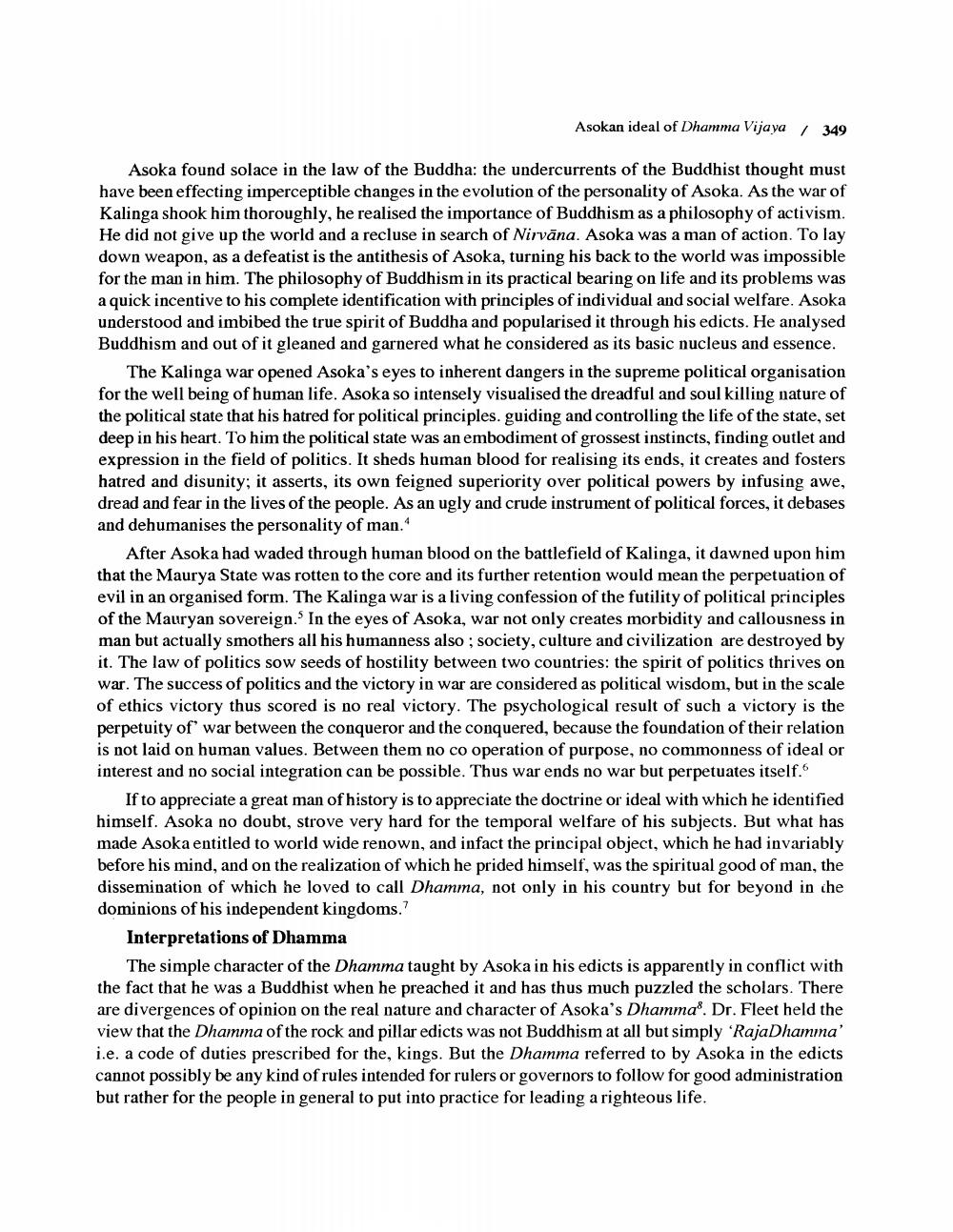________________
Asokan ideal of Dhamma Vijaya / 349
Asoka found solace in the law of the Buddha: the undercurrents of the Buddhist thought must have been effecting imperceptible changes in the evolution of the personality of Asoka. As the war of Kalinga shook him thoroughly, he realised the importance of Buddhism as a philosophy of activism. He did not give up the world and a recluse in search of Nirvāna. Asoka was a man of action. To lay down weapon, as a defeatist is the antithesis of Asoka, turning his back to the world was impossible for the man in him. The philosophy of Buddhism in its practical bearing on life and its problems was a quick incentive to his complete identification with principles of individual and social welfare. Asoka understood and imbibed the true spirit of Buddha and popularised it through his edicts. He analysed Buddhism and out of it gleaned and garnered what he considered as its basic nucleus and essence.
The Kalinga war opened Asoka's eyes to inherent dangers in the supreme political organisation for the well being of human life. Asoka so intensely visualised the dreadful and soul killing nature of the political state that his hatred for political principles. guiding and controlling the life of the state, set deep in his heart. To him the political state was an embodiment of grossest instincts, finding outlet and expression in the field of politics. It sheds human blood for realising its ends, it creates and fosters hatred and disunity; it asserts, its own feigned superiority over political powers by infusing awe, dread and fear in the lives of the people. As an ugly and crude instrument of political forces, it debases and dehumanises the personality of man."
After Asoka had waded through human blood on the battlefield of Kalinga, it dawned upon him that the Maurya State was rotten to the core and its further retention would mean the perpetuation of evil in an organised form. The Kalinga war is a living confession of the futility of political principles of the Mauryan sovereign. In the eyes of Asoka, war not only creates morbidity and callousness in man but actually smothers all his humanness also; society, culture and civilization are destroyed by it. The law of politics sow seeds of hostility between two countries: the spirit of politics thrives on war. The success of politics and the victory in war are considered as political wisdom, but in the scale of ethics victory thus scored is no real victory. The psychological result of such a victory is the perpetuity of war between the conqueror and the conquered, because the foundation of their relation is not laid on human values. Between them no co operation of purpose, no commonness of ideal or interest and no social integration can be possible. Thus war ends no war but perpetuates itself.
If to appreciate a great man of history is to appreciate the doctrine or ideal with which he identified himself. Asoka no doubt, strove very hard for the temporal welfare of his subjects. But what has made Asoka entitled to world wide renown, and infact the principal object, which he had invariably before his mind, and on the realization of which he prided himself, was the spiritual good of man, the dissemination of which he loved to call Dhamma, not only in his country but for beyond in the dominions of his independent kingdoms.
Interpretations of Dhamma
The simple character of the Dhamma taught by Asoka in his edicts is apparently in conflict with the fact that he was a Buddhist when he preached it and has thus much puzzled the scholars. There are divergences of opinion on the real nature and character of Asoka's Dhamma'. Dr. Fleet held the view that the Dhamma of the rock and pillar edicts was not Buddhism at all but simply 'Raja Dhamma' i.e. a code of duties prescribed for the, kings. But the Dhamma referred to by Asoka in the edicts cannot possibly be any kind of rules intended for rulers or governors to follow for good administration but rather for the people in general to put into practice for leading a righteous life.




